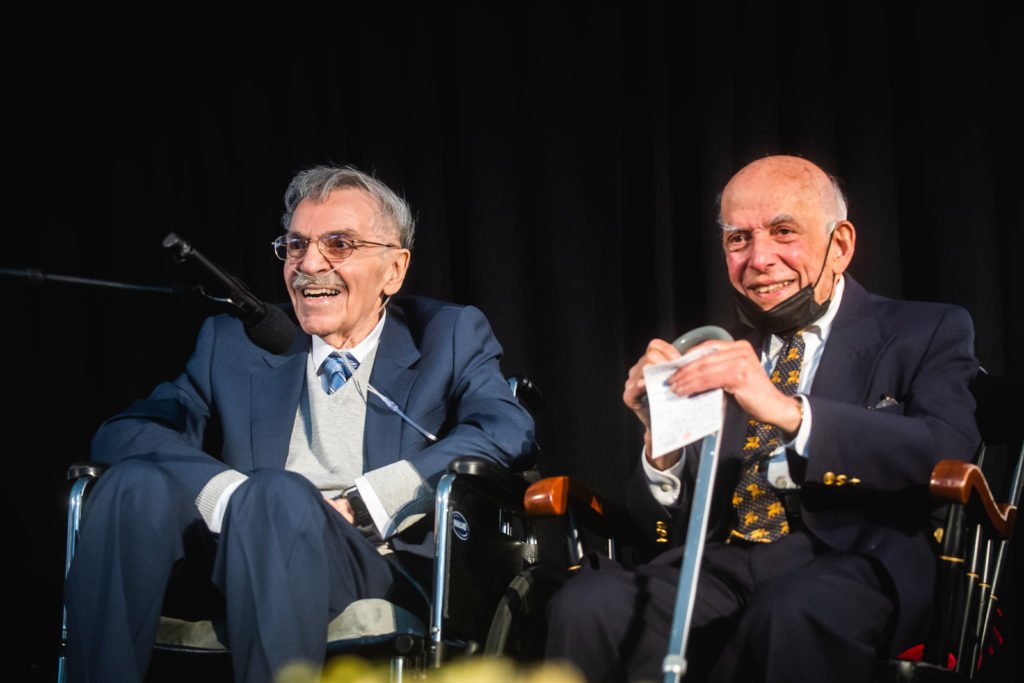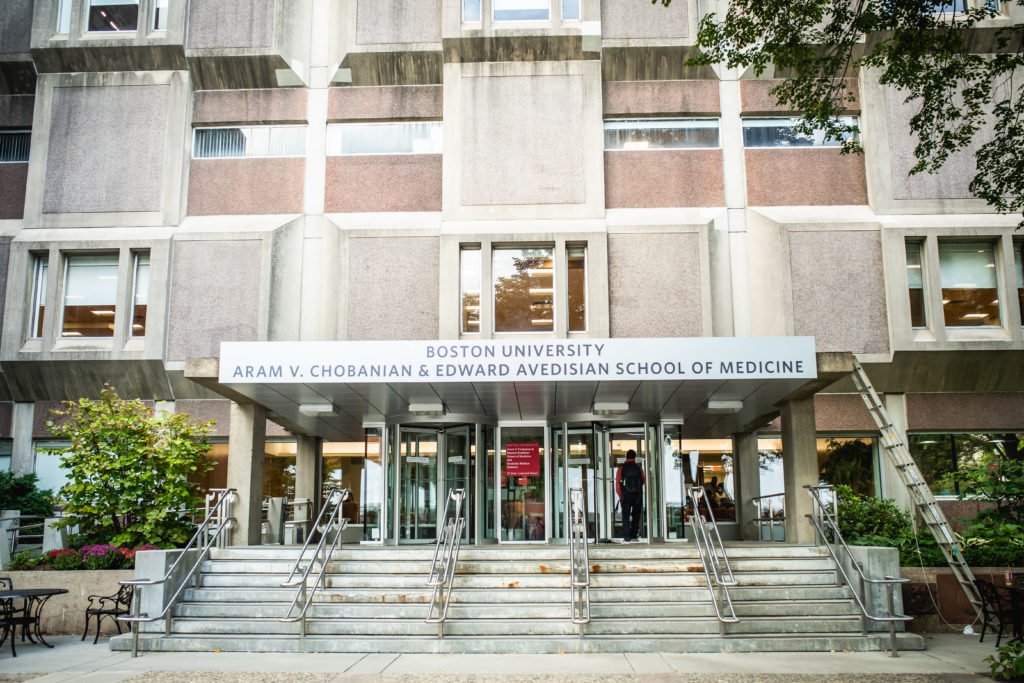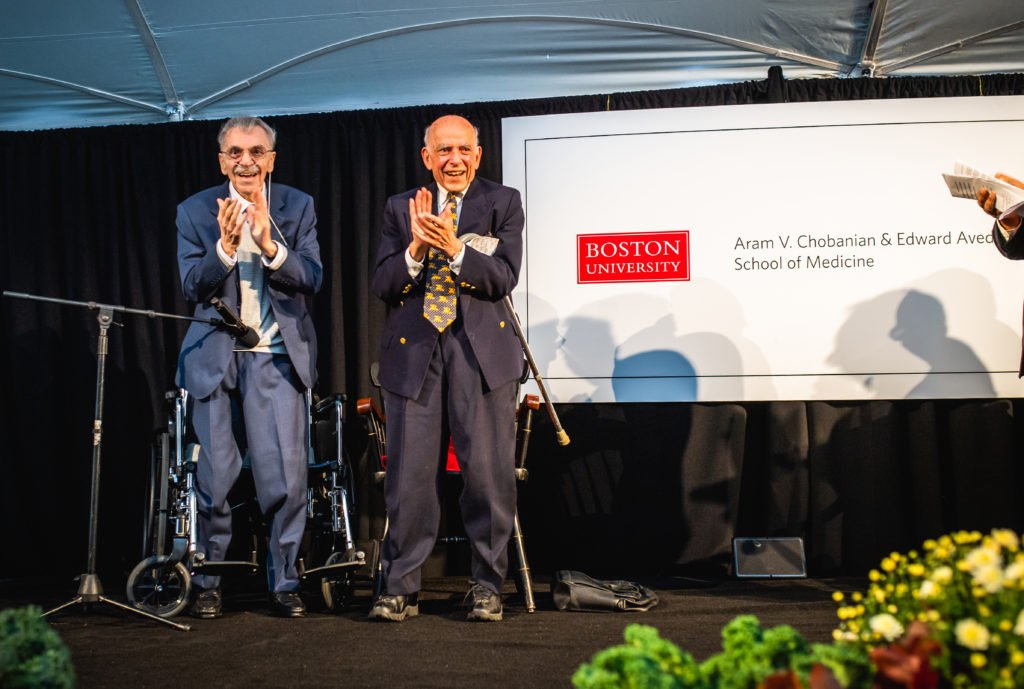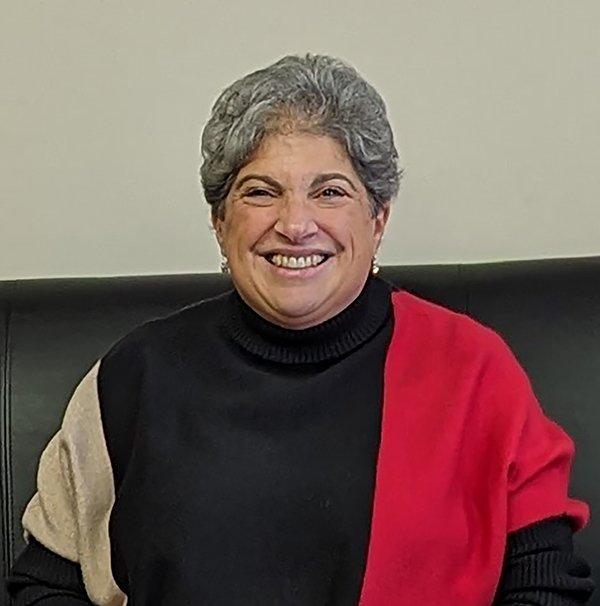
It was after the Armenian Genocide and before World War II when Edward Avedisian and Dr. Aram Chobanian first met, in the early 1940s. They were neighbors just three houses apart growing up in a working-class neighborhood of Pawtucket, a mill town in Rhode Island. Thus began a friendship that has spanned the decades, during which both accomplished men became renowned and highly regarded in their respective fields.
On Thursday, September 29 during a historic ceremony, their names became forever linked on the newly-minted Boston University Aram V. Chobanian & Edward Avedisian School of Medicine. Avedisian’s $100 million contribution to the university, which led to the renaming of the medical school, will support scholarships, endowed faculty chairs and cutting-edge research. University President Robert A. Brown called it “one of the most remarkable grants in the history of higher education” at a private signing ceremony at his residence in late August.

“It was the realization of everything I’ve done in my life – not only me, but all Armenians,” Avedisian said in a conversation with the Weekly. “We went from starving to being outstanding professionals, to helping ourselves, and this reaches out to the global community and lets them know who and what we are – to help many others.” When Dr. Chobanian was introduced at the event, “his reception was a groundswell of not just applause, but also emotion. I was quite moved,” Avedisian recalled.
Chobanian, for his part, found the entire event overwhelming, never expecting that the BU School of Medicine would carry his name, along with that of his friend. “Ed Avedisian is an unusually wonderful person that I’ve known for a long time,” Chobanian told the Weekly. “It’s nice to be tied in with him. He’s a unique individual.”
Both men expressed that in their childhood they might have been poor, but they never felt that way, as both homes were filled with love and familial devotion. The young men were encouraged to pursue and excel in education, as well as to participate in outside interests such as sports and music.

The clarinet entered their lives through Chobanian, who was the first to begin playing. He said that he took up the clarinet through band lessons at school, as it was during the Depression and private lessons were too expensive. Then, Avedisian’s older brother Paramaz, who was a couple of years younger than Chobanian, began playing. “Aram was the inspiration. Whatever Aram did, my brother did,” Avedisian said. “If Aram studied the sciences, my brother did. Aram studied the clarinet, and my brother did.” When both of them stopped, a clarinet was “left hanging around,” according to Avedisian, and he “started tinkering with it.” It became his career as he pursued bachelor’s and master’s degrees in music at BU, after which he enjoyed a distinguished, decades-long career with the Boston Pops and the Boston Ballet Orchestra. Avedisian also appeared with the Boston Symphony Orchestra and Metropolitan Opera.
BU’s President Emeritus, Chobanian decided to pursue medicine, first in his home state at Brown University, then earning his MD from Harvard University. “He’s known worldwide,” enthused Avedisian. “If you talk about hypertension, he’s the guy.” Dr. Chobanian is principally responsible for establishing the connection between hypertension and accelerated vascular disease, including atherosclerosis. This led to his work with the Joint National Commission on Detection, Evaluation and Treatment of High Blood Pressure which has developed the United States’ national health care guidelines for hypertension. With all these professional accomplishments, Avedisian asserted, “He’s always the same guy. He’s very modest, very insightful, very caring, very inspirational and always a great friend.”
Avedisian and Chobanian credit their upbringing as children of immigrants with their motivation.
Chobanian’s parents, Vahan and Marina, came from Van but did not know each other until meeting in Pawtucket. Following the killing of Chobanian’s paternal grandfather by the Turks in the late 1890s, his grandmother sent her two older sons, who were at risk of being conscripted into the Turkish army, to Constantinople. From there, the brothers Vahan and Ohannes came to the United States to work and send money back with the ultimate plan to return, which never materialized due to the Genocide. Chobanian’s grandmother, who still had a younger son with her who suffered from polio, ultimately went to Armenia, where he still has relatives. Chobanian went on to share that both his father and uncle were members of the Armenian Revolutionary Federation (ARF), and his uncle was a leader for about 20 years. “I didn’t realize who I was seeing at the time,” Chobanian said about visitors to their home. “There were people coming through who are now in Armenian history books.” He recalled General Sebouh and Garegin Nzhdeh as two of those who visited. “It was an interesting Armenian group, an intellectual group that was very impressive,” he said.
Avedisian’s parents, Shooshanig and Khoren, were both from Kharpert and came to the US in 1926 after marrying in Cuba. Khoren came to the United States in the early 1900s, planning to earn money in the family business of construction to send back. His plan was to return to Kharpert, but he was told not to go back due to the start of the Genocide. Someone thought Shooshanig, who had gone from Beirut to Cuba, would make a good match for him. After corresponding and sending his picture to her, Shooshanig said he was the man she would marry. So, he went to Cuba to meet her, and they wed the same day. They were married only 30 years before Khoren died, and Avedisian was just 14 years old. He felt the responsibility that loss left as it created hard times for the family.
The Weekly asked Avedisian about his well-known philanthropy, both here and in Armenia, and his focus on education and educational institutions. He said that both of his parents were very kind and generous. They wouldn’t hesitate to help other Armenians who had sought refuge in the US, whether it was to find employment in the local mills or to assist with citizenship. “I remember my mother going around raising money, going door to door, regardless of religious or political affiliation,” Avedisian said. He recounted a story about when his younger brother was born. His father didn’t show up for five days, and people were asking where he was. When he finally appeared, he explained that another family had needed his help. “That’s the way we learned what to do and how to do it,” he said. “It was never about you; it was about somebody else who needed it more than you.”
Education was also of paramount importance in his family. His mother was known in Armenian circles as an “educated woman” because of the English she knew and the schooling she had received at a German orphanage until it was disbanded by the Turks. Embedded at a young age, he and his siblings were told, “It was always – get your education. You don’t have to work in a mill like me.”
With this ethic in mind, Avedisian has made significant contributions to other educational institutions prior to his momentous gift to BU. The University of Rhode Island was the beneficiary of Avedisian’s generosity with a gift of $5 million in honor of his brother Paramaz who was a pharmacist devoted to his patients. Now, the building which houses the university’s College of Pharmacy is named the Paramaz Avedisian ’54 Hall, and part of the gift was to go toward a new Paramaz Avedisian Endowed Chair in Medicinal Organic Chemistry. In January 2022, Rhode Island College (RIC) received $3 million from Avedisian, the largest individual gift in its 167-year history. In recognition of his generosity, the college renamed its School of Nursing as the Zvart Onanian School of Nursing in honor of his sister who was a licensed practical nurse.
In these cases and others, Avedisian has never wanted his name to appear on a building. This was the same condition at Boston University, where he wanted his friend’s name to appear. “It should have been his name only, but we had a battle over that,” said Chobanian, who only wanted Avedisian’s name to appear on the School of Medicine building. They finally agreed to share the space, forever linking their names in a meaningful way. “That’s what was emphasized with us – to get the education – in this case, we’re making it possible for others to pursue it,” said Avedisian. He explained the great need for general practitioners in the field of medicine, a shortage that has been exacerbated by the exorbitant debt typically amassed by students in the field.
Both Avedisian and Chobanian have also made significant contributions in the Armenian community. Dr. Chobanian began visiting Armenia in the 1970s, cultivating relationships in the medical field there, providing training and offering aid whenever necessary, particularly around the time of the 1988 earthquake. Through his efforts, exchange programs for faculty and students were developed with the Yerevan State Medical University, along with an emergency medical system and ambulance system. He has also served on the board of the Fund for Armenian Relief and worked with the Armenian American Health Professionals Organization.
For his part, Avedisian has long been affiliated with the American University of Armenia (AUA), which is home to the Paramaz Avedisian Building, named for his brother. He and his wife Pamela were the benefactors of the Khoren and Shooshanig Avedisian School and Community Center, named for his parents. He explained that the school is located in a low-income part of Yerevan and offers a solid foundation with a pathway to higher education. Avedisian is on the Board of the National Association for Armenian Studies and Research (NAASR) and was a principal benefactor of the new state-of-the-art NAASR Vartan Gregorian Building. He also serves on the board of the Armenian Missionary Association of America (AMAA).
Avedisian and Chobanian, whose friendship grew in their later years through involvement with the Friends of Armenian Culture Society and other endeavors, expressed hope for the future with the donation and renaming of BU’s School of Medicine.
“BU was our second home for 60 years,” explained Chobanian. “My wife Jasmine and I were active in the BU community. It was a wonderful place. I enjoyed being able to do things for the vulnerable population surrounding us at the medical campus. The school is always going to be in that location now. It’s a safety net hospital with faculty that are all at the Boston University School of Medicine.”
Avedisian was quick to point out that Dr. Chobanian was largely responsible for the merging of Boston City Hospital with the Boston University Medical Center Hospital, now known as the Boston Medical Center.
“This is not the end of anything, but hopefully provides us with a good beginning,” said Avedisian. “We have much to gain from this.”
View this post on Instagram



Be the first to comment